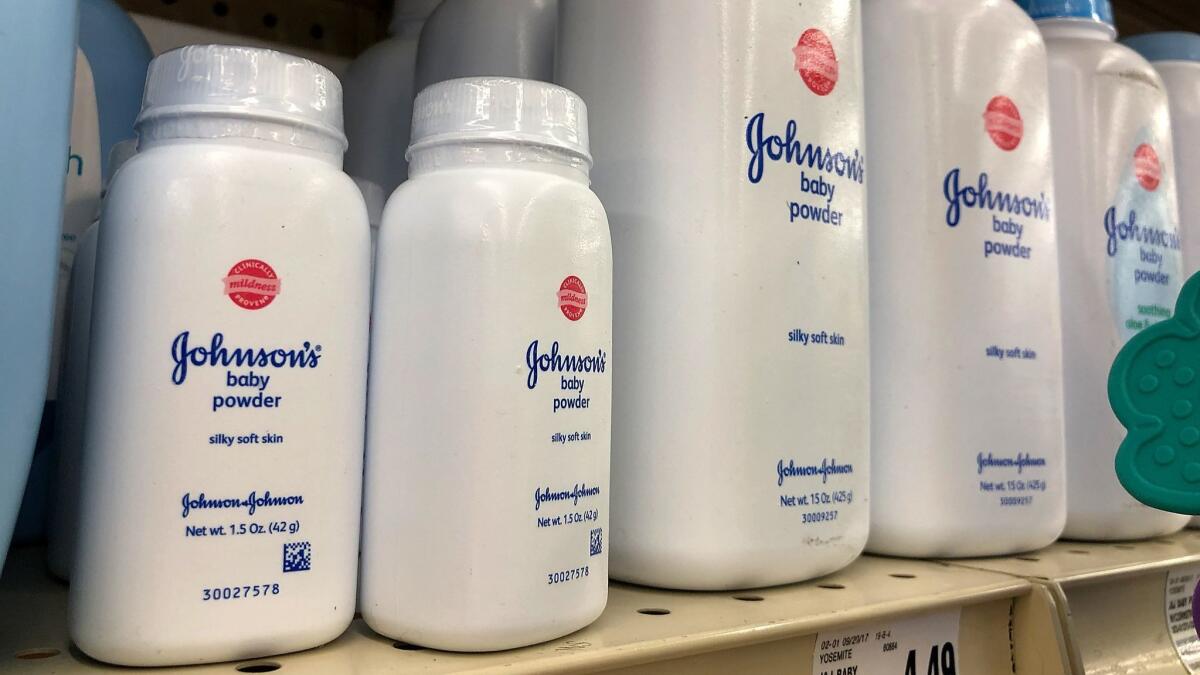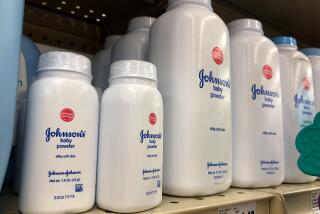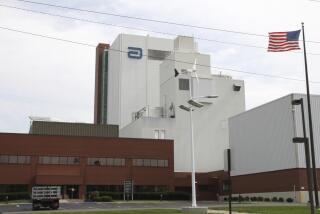J&J faces criminal investigation over baby powder’s potential cancer risks

- Share via
The U.S. Justice Department is pursuing a criminal investigation into whether Johnson & Johnson lied to the public about the possible cancer risks of its talcum powder, people with knowledge of the matter said.
The criminal probe, which hasn’t been reported previously, coincides with a regulatory investigation and civil claims by thousands of cancer patients that Johnson’s Baby Powder was responsible for their illness. Now, a grand jury in Washington is examining documents related to what company officials knew about any carcinogens in their products, the people said.
Baby powder accounts for only a tiny fraction of J&J’s annual revenue, but it has been a core member of the company’s product roster for more than a century. Questions about its safety have led to more than 14,000 lawsuits from consumers asserting that the company’s talc products caused their ovarian cancer or mesothelioma, a rare form of the disease linked to asbestos exposure.
J&J disclosed in February that it had received subpoenas, but little was known then about the investigation behind them, including whether the matter was civil or criminal. The filing didn’t mention a grand jury.
The company said in a statement Friday that there had been no new developments. “We have been fully cooperating with the previously disclosed DOJ investigation and will continue to do so,” J&J spokeswoman Kim Montagnino said. “Johnson’s Baby Powder does not contain asbestos or cause cancer, as supported by decades of independent clinical evidence.”
The Justice Department didn’t respond to requests for comment.
Shares of J&J slid 4.2% to close at $134.30.
Internal memos
J&J, the world’s largest maker of healthcare products, has said safety tests of its baby powder over many decades have shown no presence of asbestos. But some of the lawsuits have turned up internal memos from as far back as the 1960s and ’70s that contain warnings from company scientists that asbestos detected in J&J’s talc was a “severe health hazard” that could pose a legal risk for the company.
Justice Department prosecutors, FBI agents and Securities and Exchange Commission regulators are almost surely looking at whether J&J officials’ public denials were truthful, legal experts said. SEC spokeswoman Judy Burns declined to comment.
Nearly a dozen juries have concluded that J&J knew that some of its baby powder and Shower-to-Shower products had at least trace amounts of asbestos and failed to disclose that to consumers. Over the last three years, jurors have awarded a total of more than $5 billion to people who blame the powders for their cancers.
The company has said it has set aside money for legal costs related to talc claims but hasn’t said how much. Bloomberg Intelligence estimates that civil settlements could cost J&J as much as $15 billion overall. J&J says it has no liability because the products are safe.
Shares of J&J plunged as much as 17% in December — erasing billions of dollars in value — after news reports appeared about the internal memos.
Document requests
The February document requests from the Justice Department, the SEC and the top Democrat on the Senate Committee on Health, Education, Labor and Pensions sought information about the company’s knowledge of asbestos in its talc-based products. J&J said it would be “cooperating with these government inquiries and will be producing documents in response.”
The grand jury was impaneled after the Justice Department’s fraud unit started an investigation. Investigators are probably looking for more internal communications that might conflict with the company’s public statements, said Henry Klingeman, a former federal prosecutor now in private practice in New Jersey.
“Since J&J is a public company, they are probably looking at whether their statements amounted to fraudulent statements to consumers and regulators,” Klingeman said. “I’d also think they’d be looking at whether they violated securities fraud laws.”
The grand jury inquiry is likely to influence any talks between J&J and plaintiffs over resolving their claims out of court, said Peter Henning, a law professor at Wayne State University in Detroit.
“This will make it more difficult for Johnson & Johnson to settle the civil cases as long as there is a continuing criminal investigation, which may require employees to testify before a federal grand jury,” Henning said. “Civil plaintiffs may not want to settle until they know better whether criminal charges will be filed, which they can use to aid their cases.”
Investor lawsuits
In addition to the consumers’ suits, some J&J investors have accused the company of defrauding them, arguing in lawsuits that it failed to disclose that its powder was tainted and that the company’s shares were artificially inflated as a result.
Jacob Frenkel, a former SEC trial lawyer now in private practice in Washington, said there was no timeline for grand jury investigations and no certainty this one would result in charges. “This could be a high-profile government investigation that goes nowhere,” he said. “Regardless of the outcome, the timetable for such investigations can measure in years, not months.”
Baby powder is mostly talc, a mineral that is used to keep skin dry and as an astringent to prevent diaper rash. It’s also used in consumer products such as makeup, paint and dietary supplements. But geological formations that contain talc also yield asbestos, a fire-resistant mineral once used in products such as building insulation.
Scientists have found strong links between asbestos and mesothelioma, while plaintiffs’ lawyers claim that studies have also shown a link between talc and ovarian cancer. In court filings, J&J has disputed both contentions.
Indemnity agreement
J&J sold the rights to its Shower-to-Shower talcum powder to Valeant Pharmaceuticals International Inc. in 2012. Valeant, which changed its name to Bausch Health Cos. last year, has an indemnity agreement with J&J covering asbestos suits tied to the powder.
Juries in states including California, Missouri and New Jersey have ruled for some of the plaintiffs since suits started going to trial in 2016. However, some of those verdicts have been thrown out by judges and others are on appeal. Some other cases have resulted in hung juries or outright wins for J&J.
Most of the ovarian cancer cases, along with investors’ suits, have been consolidated before a federal judge in New Jersey for pretrial information exchanges and test trials. The first trials of those cases have not yet been set.
More to Read
Inside the business of entertainment
The Wide Shot brings you news, analysis and insights on everything from streaming wars to production — and what it all means for the future.
You may occasionally receive promotional content from the Los Angeles Times.










